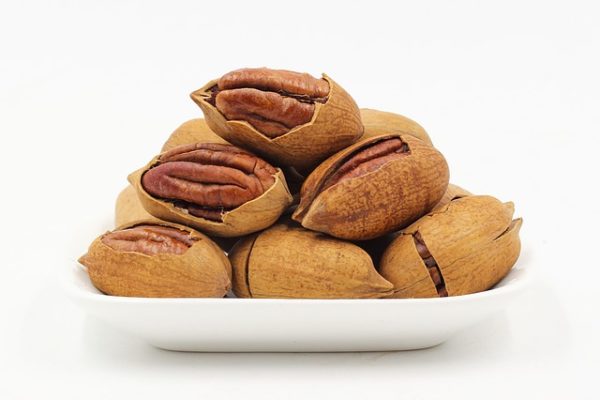 Pecans are tree nuts. They grow on hickory trees primarily found in the Southern United States and Mexico. You can recognize pecans by their smooth oblong brown shell and edible kernel found inside. The edible portion looks very similar to a walnut.
Pecans are tree nuts. They grow on hickory trees primarily found in the Southern United States and Mexico. You can recognize pecans by their smooth oblong brown shell and edible kernel found inside. The edible portion looks very similar to a walnut.
You probably already know that pecans are a great healthy snack for humans. They are loaded with protein, vitamins and healthy fats. They are often eaten by themselves or made into scrumptious pecan pies, butter pecan ice cream or other tasty treats. You might be quick to assume that pecans would make a delicious and healthy treat for your dog too. However, you would be wrong. In fact, dogs shouldn’t eat pecans at all.
Can Dogs Eat Pecans?
Pecan trees produce a toxin called juglone, which works to restrict the growth of other plants around the tree. This toxin is also found in the pecan tree’s nuts. The juglone found in pecans is safe for humans to consume. However, juglone can be harmful or even deadly for dogs.
Pecans can cause dogs to suffer from gastrointestinal upset or obstruction. Generally, the more pecans, or juglone found in pecans, that your dog consumes, the worse your dog’s symptoms will be. Consuming just a few pecans may result in your dog experiencing mild gastrointestinal symptoms such as vomiting and diarrhea. These symptoms usually last a few hours and can be treated at home.
However, if your dog consumes more than a couple pecans, your dog’s symptoms could be much more severe. Be on the lookout for more serious symptoms that require the help of a veterinarian.
Call your veterinarian if your dog experiences:
- Severe diarrhea and/or vomiting
- Loss of appetite
- Lethargy
- Blood in vomit or stool
Your dog could need IV fluids, medication and close monitoring by a veterinarian.
Moldy Pecans Can Be Deadly
Moldy Pecans can be especially harmful for dogs. Your dog could find moldy pecans in the trashcan or underneath a pecan tree. Moldy pecans can contain tremorgenic mycotoxins, or aflatoxins, which could cause your dog to have seizures or other neurological symptoms. Aflatoxin poisoning can also cause bladder stones, liver failure or even death.
If you suspect your dog has eaten moldy pecans, watch for:
- Seizures
- Jaundice- Yellowing of the eyes and gums
- Loss of Appetite
- Lethargy
- Gastrointestinal upset
- Blood in vomit or stool
- Red or Brown Urine
- Trouble or inability to urinate
Get your dog to a veterinarian right away if your dog has any of the above symptoms.
What Nuts You Can Share With Your Dog?
Nuts aren’t a necessary staple in your dog’s diet. A well-balanced dog food provides everything your dog needs. However, there are a few nuts that are safe to share with your dog on occasion.
Peanuts, peanut butter without artificial sweeteners, hazelnuts and cooked cashews are safe for dogs to eat. Be sure not to feed your dog a lot of salty nuts because they don’t need a lot of extra sodium. Also, keep in mind that small dogs may be more prone to choking and intestinal blockages caused from eating nuts.
Final Thoughts on Pecans and Your Pup
As you can see, you should never feed your dog pecans. Not only could pecans make your dog feel sick, they could also cause life-threatening health issues. Additionally, veterinary treatment and medication can quickly become very expensive.
Owners should always take appropriate measures to try and prevent their dog from finding and eating pecans. However, as all dog owners know, dogs can be sneaky when it comes to food. No matter how hard you try, your dog might still find your secret stash of pecans. They might even dig through the garbage and find old pecans you have thrown out or seek out fallen pecans beneath a pecan tree. It is important to always be aware of any symptoms your dog exhibits and know when to call the vet.

Hi, I am Andrew. I am the editor at FamilyWithPets. I am enjoy learning and sharing information about pets that helps enrich the lives of pets and pet parents.
